| Reviews & Columns |
|
Reviews DVD TV on DVD Blu-ray 4K UHD International DVDs In Theaters Reviews by Studio Video Games Features Collector Series DVDs Easter Egg Database Interviews DVD Talk Radio Feature Articles Columns Anime Talk DVD Savant Horror DVDs The M.O.D. Squad Art House HD Talk Silent DVD
|
DVD Talk Forum |
|
|
| Resources |
|
DVD Price Search Customer Service #'s RCE Info Links |
|
Columns
|
|
|
Track 29
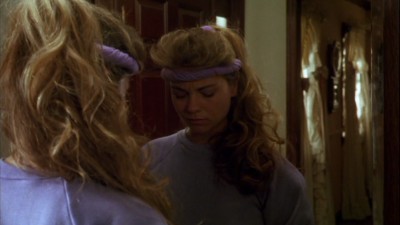
You would probably have to go all the way back to Psycho to find a film quite as full-on Freudian as Nicolas Roeg's Track 29, and that only begins to describe it. Released in 1988 as the last of the string of pictures starring his then-wife Theresa Russell that Roeg made that decade (1980's Bad Timing and 1985's Insignificance being among the others), and written by Dennis Potter (best known for his BBC miniseries Pennies From Heaven and The Singing Detective), it was, like many of Roeg's works, neither critically embraced nor at all well-attended (for every beloved Walkabout, there have been a number of contested Man Who Fell to Earths). But appreciation for Roeg has increased, and his reputation benefited, from the opportunities the DVD age has afforded us to revisit his strange, extremely idiosyncratic, visually indelible journeys--all delirious and brazenly nonsensical by any rational-realist standard, but all worth getting familiar with and appreciating as experiences that nobody but Roeg would be able to (or would even think to) concoct for us.
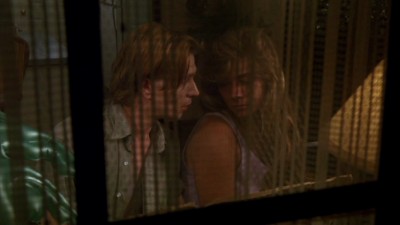
There are actually some notable parallels between Track 29 and The Man Who Fell to Earth, with Gary Oldman rather than David Bowie playing the thin, pale, redheaded unknown quantity of mysterious origin--here called "Martin"--that's going to blow some minds when he crashes into their lives. The scale in Track 29 is a bit smaller and more domestic, however; Martin is an orphan returned back to the States as a grown man after having been adopted and raised in England, and the existences he crashes into and alters are that of a model train-obsessed doctor, the Nabokovian-named Henry Henry (Chistopher Lloyd) and his frustrated, bored, approaching-alcoholic wife, Linda (Russell), who live in a particularly ugly, affluently desolate patch of suburban North Carolina, in a McMansion with a swimming pool located on a highway and underneath a water tower. Henry cares more about his elaborate model train set-ups, his upcoming speech to a convention of like-minded miniature-locomotive aficionados, and his kinky, job-endangering after-hours affair with Nurse Stein (the atypically well-cast Sandra Bernhard) than he does about Linda, her desire to have a child, or her ongoing depression which, we learn, is the result of her having been raped and impregnated at a carnival at the age of 15 and then having had the baby taken away from her and put up for adoption. Whether the sexy-sinister Martin--with his English accent that makes him stick out in the South like a sore thumb, his claim that he's the child Linda was forced to give up years ago, and his alternating lothario-like erotic suaveness and stomping around, pouting, and whining like an actual child--is really Linda's son returned to her, a more abstract Return of the Repressed, or actually exists anywhere but in her fantasy life is a question left open by the film, but suffice it to say it doesn't stay "grounded" in any kind of straightforward realism for very long at all--just a few basic details, then we're off through the looking glass and into the Freudian dreamscape.
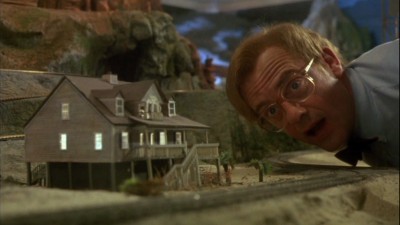
If you've ever seen Don't Look Now or Bad Timing, you'll recognize Track 29's persistent refusal to stay "realistic" as entirely in keeping with Roeg's usual MO. When it comes to unfettered broad strokes, seemingly intentional hamminess of performances, and just general rococo excessiveness, Roeg's only comparable competition among auteurs is Brian DePalma. But whereas DePalma's films are usually fairly minutely (however deliciously unbelievably) detailed in plot, Roeg's work best when considered as extended riffs, audiovisual variations on themes that have little to no interest in linearity, cause-and-effect, or psychologically motivated character development. That his overarching, primary interest is in the visual impact of his films makes sense when one recalls that Roeg began his career as a cinematographer (for Lawrence of Arabia among other films), and that preoccupation with the making and fitting-together of unusual, striking, disturbing images is as present in Track 29 as it is in any Roeg picture. The particular way that the camera is positioned or move to reshape the composition; the tempo at which cuts are made between Linda, her maternal-level collection of baby dolls, and Martin, her possible long-lost son/newfound receptacle of erotic energies; or the way Dr. Henry's speech is delivered before a giant American flag to the ebullient strains of a contemporary version of "The Chattanooga Choo-Choo" in some kind of slightly disproportionate, remarkably "off," nightmare version of an audiotorium full of model train obsessives--these strange, perhaps initially off-putting emphases, along with the comparatively little time Roeg has for conventional cinematic virtues like restrained, finely-honed performances (it seems the actors here were encouraged to go at least somewhat cartoonish/archetypical across the board) or airtight plotting, signify that free-associativeness and evocation are the important thing, that it's the allegorical meanings or associations that are of overriding significance.
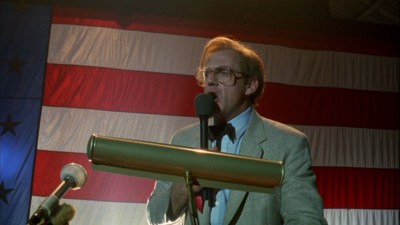
In that context, the recurrence of the Stars and Stripes and the emphasis on the Henrys' suburban-domestic environment and their collections of miniaturized, artificial objects of displaced desire (his trains, her dolls) might encourage the impression that the film makes the most "sense" as a visually rich, hyper-exuberantly anti-realist evocation of the eternally disturbing family-romance nature of sexuality we have Freud to thank for bringing to the light of day; the self-infantilization of adults, the variations on the word "mother" and the disconcerting scenarios in which "mom," "mommy," and even "daddy" are employed in Track 29 would drive Hitchcock's Marnie herself into a Frenzy, pardon the pun. The film works equally well as an allegory for the American dream, its gender roles and dominant values, its particular state of spiritual bankruptcy and visible, physical asymmetry and decay at the particular historical and political moment it depicts. (The costumes and decor make it impossible not to realize that we're looking at the late '80s, and it is key to understanding the film that the time/place are abundantly clear, whatever else might be left ambiguous.) It's all very anti-dramatic and, in any plot-driven-narrative sense, anticlimactic (if you absolutely have to have things like closure, resolution, and logic in your movies, you need to stay far away from Track 29). In fact, the duller moments in the film (and there are, it has to be acknowledged, a few too many) occur when the free flow of transfixing, suggestive images halts for a more standard shot/countershot setup in which characters converse or otherwise interact in a way that's supposed to pass as ordinarily dramatic. But since the film's narrative isn't plot driven, and instead constructed through a visual chain made from outsized, outrageous visual-symbolic links, what's most important is that those images are strong, compelling, and unique enough to render us unable to turn our eyes away. That's always been the most convincingly enjoyable and meaningful way to look at Roeg's films, and Track 29 pulls it off to a degree that, though the film is flawed and less of a wholly realized work than Bad Timing or Walkabout, make it something well worth the time and attention of any curious cinephile.
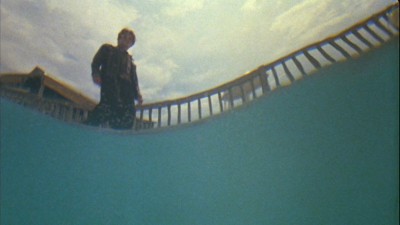
THE DVD:
The 1.78:1 aspect-ratio, anamorphic-widescreen transfer is good, just short of excellent; it retains much of the film's celluloid texture, which Roeg's photographic sensibility practically fetishizes, and the play of light, color, and shadow comes off well. There is only the most occasional and fleeting bit of aliasing and noise reduction to mar the experience, but overall it's a nice job.
Sound:The Dolby Digital 2.0 soundtrack sounds very good, perfectly clear in all dimensions. There does seem to be some discrepancy between the loudness of music/sound effects and the comparative softness of dialogue when the former elements come on in full force (and there are some jarringly loud sound/music cues) in this particular presentation, but it never comes close to being any sort of insurmountable flaw in an otherwise nicely rendered sonic presentation.
Extras:None.
FINAL THOUGHTS:Bizarre, surreal, over-the-top, yet captivatingly dense with rich visual subtleties to offset its intentionally blunt and garish dialogue and performance, Nicolas Roeg's Track 29 isn't really a masterpiece, but it is a compelling-enough manifestation of Roeg's inimitable, fantastical-allegorical approach. Its Tennessee Williams/soap-opera-on-hallucinogens performances, its often wonderfully audacious, surreally sensuous visuals, and its jolting rhythm as it lurches in a pleasurably discombobulating way from Freudian mother/son sexuality to gender politics to cultural critique all come at you straight through your optical and auditory senses, without making any detours to any rational or disbelief-suspending part of your brain. It's primarily a ride, a trip, an experience, but it's more substantial than that might make it sound; it has a nagging, lingering meaningfulness to it, its indelible images and off-kilter take on reality both crying out for and complicating interpretation, like some vivid but only tentatively explicable dream. It is more watered down than top-notch Roeg, but it works rather well as a minor entry in his filmography; it may be lighter on the strong, forceful, unforgettable imagery and uninterrupted free-associativeness than his best films, but when it's firing on all cylinders, it's right up there with his inscrutable, dazzling, fever-dream best. Recommended.
|
| Popular Reviews |
| Sponsored Links |
|
|
| Sponsored Links |
|
|
| Release List | Reviews | Shop | Newsletter | Forum | DVD Giveaways | Blu-Ray | Advertise |
|
Copyright 2024 DVDTalk.com All Rights Reserved. Legal Info, Privacy Policy, Terms of Use,
Manage Preferences,
Your Privacy Choices | |||||||













